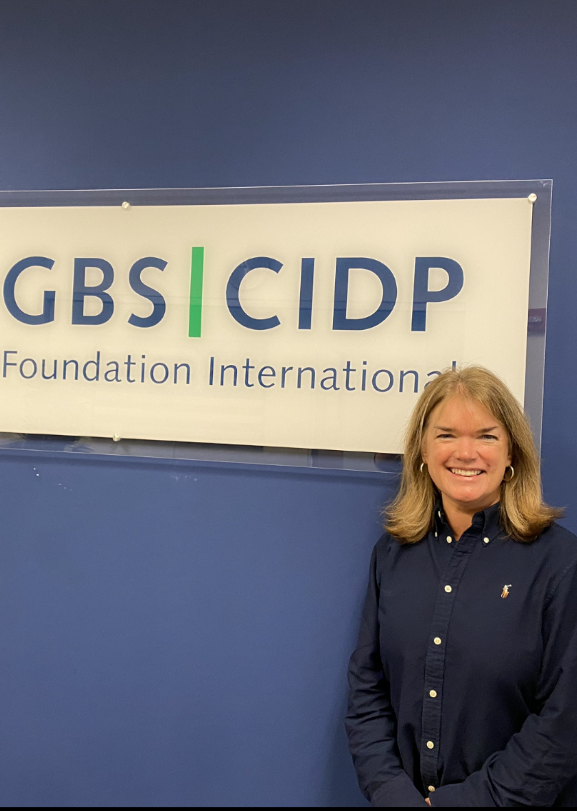
Share this post
November 5, 2021
PA Rare Disease Leader Profile: Lisa Butler of GBS|CIDP Foundation International
This is the fifth in a series of profiles of the leaders of rare disease organizations based in Pennsylvania.
- Full Name: Lisa Butler
- Current Hometown: Blue Bell, PA
- Organization’s Name: GBS|CIDP Foundation International
- Mission of the Organization: We improve the quality of life for individuals and families affected by Guillain Barre Syndrome (GBS), Chronic Inflammatory Demyelinating Polyneuropathy (CIDS) and related conditions. Our unwavering commitment to the patients we serve is built on four pillars: support, education, research and advocacy.
- We support patients by nurturing a global network of volunteers, healthcare professionals, researchers and industry partners to provide them with critical, timely and accurate information;
- We educate doctors, clinicians, patients and caregivers to increase awareness and understanding;
- We fund research through grants, establishing fellowships and other appropriate avenues to identify the causes of and discover treatments;
- We advocate at the federal, state, and grassroots levels to educate policymakers and help them make informed decisions that benefit our patient community.
- Rare Diseases Covered by the Organization: Guillain Barre Syndrome, Chronic Inflammatory Demyelinating Polyneuropathy, multifocal motor neuropathy and variants thereof.
- Your Role at the Organization: Executive Director
- How You Got Involved with the Organization: In 1992, my father-in-law was diagnosed and then recovered from Guillain Barre Syndrome. Although not a genetic condition, ten years later our 5 year-old son was diagnosed with Guillain Barre. We contacted the Foundation and immediately had access to a pediatric specialist from the Medical Advisory Board, we received printed educational materials, we connected with a patient volunteer, all of which were extremely helpful with our understanding and treatment plan.
After our son recovered, he and I both became volunteers for the Foundation and in 2013, I joined the staff to lead the volunteer program, marketing and development, and eventually into a leadership role as Executive Director.
- What You Are Most Proud of or What You Are Excited About Doing Next: I hope we are always listening more than talking. In listening, we constantly looking for the next unmet need and then we go to work to create a program or locate the best resource. The ability to continually evolve and deepen our response is such a privilege. We have a very dedicated Board of Directors and a staff team that is so devoted. This combination provides the groundwork to inspire, empower, and execute our next emerging strategy! I look forward to expanding our reach worldwide to both patients and caregivers, as well as physicians working in the field of GBS|CIDP and variants thereof.
- What You Find Most Rewarding in Your Role: The strength and courage of the patients is truly inspiring. In forty years, we have never lost sight of the patients, and we continue to put their needs first. By providing accurate information, created by worldwide experts for patients and families, we educate the community. With our deeply dedicated all volunteer Global Medical Advisory Board, we provide access to the world’s top experts for all families. Through our many programs, we provide a space where patients can meet patients. Building this community connection is the heart of what we do.
Coaching our patient community to be Advocates is incredibly fulfilling. Providing the training to infuse confidence in speaking with Members of Congress or Senate truly emphasizes that every journey matters. Listening and sharing these stories brings awareness and empowers every patient.
- What You Find Most Challenging in Your Role: There is inequity in the healthcare system. This includes access to products and care. We would like to see the community served where all patients have access to all products and all points of care. These are rare conditions and therefore not always accurately diagnosed and treated in a timely matter for optimal recovery. We need to better educate the medical community, especially in under-served communities.
- Resources You Recommend to Other Rare Disease Advocates: Become members of the National Organization for Rare Disorders and the National Health Council. Subscribe to become members (usually this should be free of charge) of similar non-profits in similar areas so that you can see how they do programs, communications, development, etc. Join nonprofit leadership social media groups, you’ll find valuable support in peer-to-peer connections. Also, technology plays a key role in both communicating and understanding your membership. Conferences such as NTEN, the Nonprofit Technology Conference, can be a valuable tool to stay ahead of technology curve. There are so many amazing leaders in the space, recreating the wheel is not necessary!
- Any advice you’d like to share with the rare disease community in PA: If not already established, a medical or scientific advisory board is essential to ground all of the work you are doing. Trust is critical and establishing the non-profit as the place of truth and connection to experts is the core of trust. A dedicated, diverse Board of Directors is also crucial to establish effective donor stewardship and drive the mission and vision for the organization. While we may not have all the answers, we should have resources to move a process, problem or process forward.
Continually ask about unmet needs and create programs around those. Listen more than talk and always provide spaces (time and programs) where patients can connect with patients.